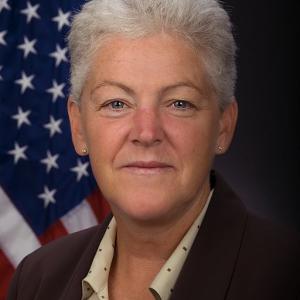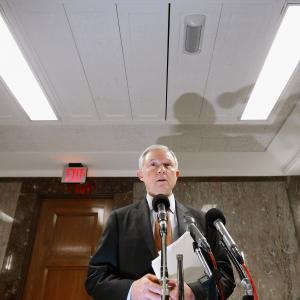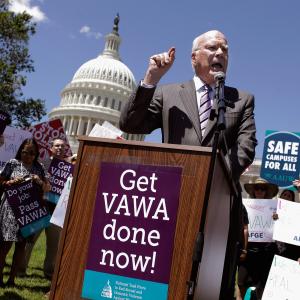
Janelle joined Sojourners in 2012, first as a Campaigns Assistant in the Cycle 29 intern class and as Online Organizing Associate until 2015. Before coming to Sojourners, Janelle worked with Mennonite Central Committee (MCC) in Bujumbura, Burundi.
Janelle grew up in the DC area. She first became interested in social justice in her (Catholic) high school religion class, which focused heavily on nonviolent movements in India and El Salvador. She chose to act on that passion by studying international relations at American University; an internship at MCC’s Washington Office sparked a deeper interest in policy advocacy.
Janelle lives in Hyattsville with her husband Frank and their fluffy cat Maggie, and attends Hyattsville Mennonite Church. She loves board games, good beer, craft projects, long walks, and pretty much anything else you might throw at her.
While Janelle doesn’t remember how she first heard about Sojourners, her mother grew up in a household that got The Post-American so perhaps it runs in the blood.
Posts By This Author
'Fiddling While the World Burns:' A Faithful Response to Partisan Gridlock
Last week, concentrations of carbon dioxide in the atmosphere reached 400 parts per million – nearly 15 percent over what many scientists estimate is a safe level. Amid this and other crises in creation, the Environmental Protection Agency needs a strong leader to navigate the complex policy and economic situation that governs environmental policy.
In March, In March, President Barack Obama nominated Gina McCarthy to lead the EPA. At the time, many regarded her as a shoo-in, as she has held top posts under Republican governors, was endorsed by many in the energy industry, and has acted as assistant administrator of the EPA under President Obama since 2009.
It was surprising, then, when all eight Republican members of the Senate’s Environment and Public Works Committee decided to boycott McCarthy’s nomination hearing. This surprise decision, which effectively canceled the vote, was part of a longer-term pattern of obstruction and partisanship on once-routine matters.
In the face of such unprecedented risk to human health and well-being, many were surprised that senators tasked with studying issues of clean air, clean water, and similar issues put ideology ahead of fairness in obstructing the vote. Sen. David Vitter, the leader of the obstructionist group, said it best himself in 2005 when discussing judicial appointments: “I think that every nominee deserves a vote. It’s a matter of fairness.”
Food Aid Reforms Could Save Millions of Lives
There might be big changes coming to the United States food aid program this year, and it could save millions of lives.
U.S. food aid, which began in the 1950s, spends an average of $2 billion a year* and has done much to prevent hunger and starvation across the globe. However, it has also been criticized for being inefficient, wasteful, and even self-serving.
Currently, up to 75 percent of the money we spend on food aid has to be used to pay for purchasing food from American farmers and shipping them overseas. This food saves lives, yes, but up to 16 percent of the money is spent on shipping. To make matters worse, American commodity crops are often significantly more expensive than food bought elsewhere.
Without such high requirements for American commodities, more money could go to buying food and saving lives. In fact, the United States is the only donor country to mandate by law that a certain amount of its donations must support its own economy.
Furious with Senate, Activists Go After the Roots of Gun Culture
Before last week’s Senate vote, we learned that 90% of Americans supported universal background checks as a way to reduce gun violence.
The Senate’s vote against background checks shows that public opinion is not the driving — or defining — force behind America’s gun culture. In fact, to find that force, you don’t have to look any farther than money.
EPA Gives Rebuttal to State Department's Keystone Analysis
In the midst of our celebration of Earth Day, government agencies continued the debate over the Keystone XL Pipeline, which would transport oil from Canada’s tar sands across the United States into the gulf coast of Texas to be refined and shipped elsewhere. The State Department, tasked with reviewing the pipeline’s environmental impact, gave it a tentative pass a month and a half ago.
Activists across the country sprang into action to oppose the pipeline, citing its contribution to climate change and risk of oil spills. Supporters of the pipeline shot back, denying the climate impact of the pipeline and claiming that the oil would be produced whether or not the Keystone project moved forward.
The Environmental Protection Agency responded yesterday, calling into question the State Department’s findings and echoing the concerns of environmental activists everywhere: the Keystone Pipeline would be greatly exacerbate climate change.
The Gathering Storm
Climate change leads to far more consequences than just destructive weather patterns.
Climate scientists have warned that climate change will bring about—and already is bringing about—more frequent and fiercer storms. But climate change leads to far more than just destructive weather patterns, with consequences in almost all aspects of our lives. Here are just a few of the many possible effects of our rising global temperature.
Natural disasters will increase.
Climate change increases the risk of natural disasters that disproportionately affect low-income people who lack the resources to prepare, recover, or relocate.
Food will be scarcer and more expensive.
Food prices increase as farmers face new levels of unpredictability in weather patterns. Drought and floods may cause widespread soil infertility and increased plant diseases.
We'll experience more drought—and floods.
Changes in weather patterns lead to both increased drought and flooding, because warmer air can hold more water. Many dry places will become drier, while others will be inundated with rain.
Major Oil Spill in Suburbia Shows Risk of Pipelines
Residents of Mayflower, Ark., spent Easter weekend evacuated from their homes as Exxon Mobil attended to a major oil spill from a crude oil pipeline. Residents described scenes of oil running down the streets like a river, as 22 families were forced to leave their homes.
Since the pipe burst on Friday afternoon, cleanup crews have collected around 12,000 barrels of oil and water. Images from the weekend show quiet cul-de-sacs inundated with thick, black sludge, and parents reported concern for their children and whether they would be able to play outside.
Alabama Senator Denies the Moral Responsibility of Immigration Reform
The momentum for immigration reform is building across the country, but leaders in Washington are often the last to realize the seismic shifts taking place. The most recent example is when Alabama Sen. Jeff Sessions made the claim that there is no “moral or legal responsibility to reward somebody who entered the country [without documentation].”
No moral responsibility? Many Christians believe otherwise.
The Sequester: Pocket Change?
“I believe the sequester is a pittance.”
Those were conservative Sen. Rand Paul’s words in an opinion piece this week about the sequester – severe and arbitrary cuts to the federal budget that Congress did nothing to stop. We could give him the benefit of the doubt and assume he hasn’t seen the numbers:
- The nutrition program for women with children — WIC — will have to turn away 600,000 to 775,000 women, many of whom have young children.
- The 3.8 million currently unemployed workers will have their support cut by 11 percent.
- 100,000 low-income families will lose their housing vouchers.
- 125,000 individuals and families are now at risk of homelessness.
That doesn’t sound like a “pittance” to me.
John McCain Gets Tough on Immigration
One angry constituent asked repeatedly where the “dang fence” that McCain had promised was. The senator turned to a chart illustrating how much fence had been constructed (hint: it’s a lot), and the man shot back that it was not a fence. “Oh, it’s not a fence?” McCain challenged. “OK, it’s a banana. We put up a banana with about $600 million of appropriations.”
Wow. Talk about laying down the law.
McCain even alluded to the work of the faith community on changing the message on immigration. Why are we not going to deport immigrants who have been living in the country for over 40 years? “Because we are a Judeo-Christian nation,” McCain affirmed. Mass deportation is contrary to our values.
Sawdust and Mistaken Identity
I had a happy childhood, with few moments of true anguish. One that I will always remember, though, is when they cut down the tree on Euclid Street.
Throughout my early years, I would often take walks with my parents down this street, stopping to play on this tree’s bulging roots and hug its large trunk. On this particular weekday, my favorite tree had been replaced with a stump and some sawdust due to the risk of it falling over and taking out all the power lines its branches had engulfed. My four-year-old self was in shock.
I spent the afternoon wailing, to the dismay of my parents and the neighbor who came over for a play date. To this day, when I walk down Euclid Street and see pieces of the branches still hanging on to the power lines, I remember what it felt like to lose my first friend.
Violence Against Women Act Moves to the House
Good news: the Violence Against Women Act passed the Senate this afternoon. While the bill still must proceed to the House of Representatives, this is a promising step for women across the country.
VAWA provides much-needed services and protections for women, which should not be a controversial issue. However, the bill expired in 2011 and has yet to be reauthorized, with most of the delay coming from a debate over whether the protections can extend to Native American women living on reservations.
A recent story shows the importance of extending these protections to Native woman: the woman profiled was attacked by her (white) husband, but neither the tribal court nor the local police felt they had proper authority to protect her.
This is not an isolated incident: during the Senate hearing on the bill, Sen. Maria Cantwell (D - Wash.) pointed out that Native American women are raped and assaulted at 2.5 times the national rate, and fewer than 50 percent of domestic violence cases on reservations are prosecuted.
Stand and Support the Violence Against Women Act
As much as we like to believe we live in a safe country for women, we know this is not the case. Women and girls across the country are subject to rape, abuse, intimidation, and sex trafficking, with the number of victims growing each day.
Progress has been made over the past decades, thanks in part to the Violence Against Women Act. This policy protects women by providing everything from funding for rape crisis centers to increased collaboration with law enforcement to hold perpetrators accountable. VAWA is our country’s promise to women and girls that we will not allow them to be violated and abused.
The Violence Against Women Act is up for a vote in the Senate next week, and Americans from every corner of the country are calling our policymakers to reauthorize this important legislation. Since it was first passed in 1994, VAWA has received strong bipartisan support and shown its effectiveness in making communities safer, healthier, and better stewards of their resources (in the first 6 years since it was introduced, VAWA saved communities $12.6 billion).
VAWA expired in 2011, and has yet to be reauthorized.
Faith Community Organizes Call-in Day to End Gun Violence
The pressure from the faith community on Congress to address gun violence is building. There have been vigils, marches, and press conferences. Faith leaders have visited the White House and lobbied on the Hill. Now, an interfaith call-in day is being organized on Feb. 4 to ensure Congress hears directly from people of faith demanding change. This is a chance for your voice to ring through the halls of Congress.
While the debate on sensible gun restrictions has continued, local evening newscasts continue to run stories highlighting yet more tragic deaths from gun violence. We need more than a conversation. We need Congress to find the courage to lead.
Help End the NRA’s Dangerous Idolatry of Guns
“Idolatry of guns.” What does that mean, exactly?
It might be hard to admit, but if you think about it, you can see that many groups in the United States see guns as sacred. Guns are not only the solution to our problems, they will save us from evil. Wayne LaPierre, the executive vice president of the National Rifle Association, stated this himself: “The only thing that stops a bad guy with a gun is a good guy with a gun.”
Do we really believe this? If we stop and think about it, we don’t. Our protection does not come from guns, and we do not live in a binary society of good and evil, where the right to hold dangerous weapons can be allocated to people who are entirely virtuous.
A Path Forward on Climate, Or, Obeying God
President Barack Obama’s Inauguration Address this week included a bold statement about his vision for addressing climate change. In fact, he redefined the issue of environmental protection as not only morally important but a command from God. After the vacuum of discussion of climate change during the presidential campaign, this proclamation came as a welcome surprise.
Most analyses of Obama’s speech point to the fact that the reason he was able to say what he did is that American public opinion has solidified behind these ideas. Plenty of polls will tell you that the number of Americans who accept the reality of climate change has soared in recent years, perhaps partly due to the natural disasters the president mentioned.
The Political Power of Immigration Reform
Conventional wisdom is that President Barack Obama won re-election in November in part because of shifting demographics and the rising Latino vote. The research confirms it, but also tells us another story: both parties have much to gain by courting Latino voters, and much to lose if they assume November’s pattern will be repeated with no additional effort.
New polling analysis by Latino Decisions shows that for the first time in history, Latino voters can plausibly claim to have decisively influenced an election. If Latinos had supported Mitt Romney by the same margins they had supported George W. Bush in 2004, the outcome would have swung in favor of Mitt Romney.
However, this does not mean that the tide of politics has inevitably turned towards Democrats. In fact, Latino voters are the most “moveable” racial voting bloc, meaning that both parties have an opportunity to win Latino votes, provided they reach out to the community in meaningful ways.
Climate Change at Christmastime: Hug a Tree!
Some of my environmentally conscious friends have expressed concern about having a real Christmas tree in their house – it seems wasteful to cut down an entire tree just for a month or so of décor. After all, climate change is a huge problem, and its potential impacts on the world (most especially the poor) seem contrary to the Christmas spirit.
It’s not a new worry – Teddy Roosevelt actually banned the White House Christmas Tree during his time in office, as he was worried about the conservation implications of people running out to cut down the forest.
We can rest easy, though – the live Christmas tree industry that has developed since that time is actually a benefit to the global climate. Here’s why.
What Are You Singing: Do You Hear What I Hear?
Whoops. I was joking with a co-worker today about writing a subversive post about how the song “Do You Hear What I Hear” is an extended metaphor for the Roman Empire’s takeover of Christianity, contorting Jesus’ message for its own ends. “Listen to what I say,” orders the unnamed king, as he urges adoration of Jesus and calls for peace — Pax Romana.
I did a quick Wikipedia search, and learned exactly how wrong I was. Rather than a subversive message about the twisting of the Gospel, “Do You Hear What I Hear” was actually a call for peace during the turbulence of the 1960s.
I mean, think about it: the song talks about the humbleness of the announcement of Jesus’ birth – only the night wind and the little lamb have heard about it. This whisper gets passed up to ever-increasing degrees of authority (a grassroots movement if we’ve ever seen one), until the king himself is calling for peace.
10 (More) Reasons to Support Immigration Reform
There are many reasons to support comprehensive immigration reform. As Christians, we point to the biblical call to welcome the stranger and love our neighbors as top reasons for our support. We refer to the God-given dignity of each person, acknowledging that God created and loves each person, regardless of their immigration status.
But it helps to remember that there are significant economic and political gains to be had, as well. A Politico poll shows that nearly two-thirds of Americans support comprehensive reform. As we push on our political leaders to make a decision this year, here are some of the other arguments we can use, as described in a recent article on Think Progress:
1. Legalizing the 11 million undocumented immigrants in the United States would boost the nation’s economy.
2. Tax revenues would increase.
3. Harmful state immigration laws are damaging state economies.
4. A path to citizenship would help families access health care.
5. U.S. employers need a legalized workforce.
6. In 2011, immigrant entrepreneurs were responsible for more than one-in-four new U.S. businesses.
7. Letting undocumented immigrants gain legal status would keep families together.
8. Young undocumented immigrants would add billions to the economy if they gained legal status.
9. And DREAMers would boost employment and wages.
10. Significant reform of the high-skilled immigration system would benefit certain industries that require high-skilled workers.
Read the article for a full explanation of each item.
What Are You Singing: Joy to the World
I’ve been really lucky this month to hear some of my co-workers’ reflections on the social justice implications of their favorite Christmas carols. It’s been a great opportunity to reflect back on what it is we sing and celebrate each year, the truths we profess without even knowing it.
Naturally, I wanted to get involved, as well. As I was running through the songs I love, "Joy to the World" suddenly popped up in a new light:
Joy to the World, the Lord is come!
Let Earth receive her King;
Let every heart prepare Him room,
And Heaven and nature sing,
And Heaven and nature sing,
And Heaven, and Heaven, and nature sing.
















